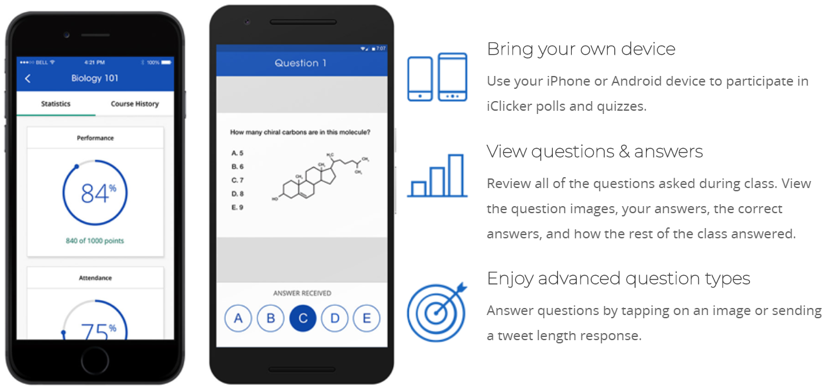Abstract
The iClicker Reef project revisits previous efforts to enhance the CUClickers service: to assess whether the BYOD classroom response system will function efficiently within CU Boulder's infrastructure and provide additional functionality that instructors and students perceive as beneficial to teaching and learning.
Challenge
CUClickers and the iClicker technology allows students to actively participate in class and answer questions provided by the instructor. OIT’s CUClicker service is available in most classrooms and lecture hall media cabinets. iClicker infrastructure is provided as a common-good to the campus. iClicker remotes are available for purchase at the CU Bookstore.
This iClicker Reef project focused on a discovery phase, which included a campus survey, student focus groups, and faculty interviews, to better understand and document their needs and desires for a classroom response system. We conducted a usability study to assess whether CUClickers and the iClicker technology functioned efficiently within CU Boulder's infrastructure, if there was interest from instructors and students for a BYOD classroom response system, and collected feedback from participants as they experimented with the additional functionality available through iClicker Reef. The project also reviewed previous Reef pilot efforts completed on campus.
The Academic Technology Application Program (ATAP) partnered with the Academic Technology Design Team (ATDT) to investigate and analyze the iClicker service to answer the following questions:
- What information can be gleaned from the data collected through the iClicker service and previous pilots?
- What are the perceptions of instructors and students about using iClickers (among users and non-users)?
- What features or functionality do instructors and students use and desire of an audience response service?
- What benefits would instructors and students receive by implementing iClicker Reef on campus?
- What are the technical requirements to support an iClicker Reef implementation on campus?
- What is the cost for instructors, students, and OIT to invest in iClicker Reef?
At the end of this project, we will provide a recommendation report detailing the benefits for campus, a way forward for OIT, and associated rationale for iClicker Classic and Reef. This report will include the development of a communication plan, assessment tools, and an assessment schedule to engage campus in future efforts and grow the CUClicker Service.
Solution
The CUClickers program transition to iClicker Cloud as the main supported audience response service in the Fall semester 2020.
Accomplishments
- Cross team collaborations
- Invitation to work with WRTG 3035 students
- Our ability to iterate on the CU Clicker service processes based on ongoing project findings
- Capacity of faculty to test wireless at the tail end of the project
Alignment with Strategic Goals of the University
CU Boulder has been on the leading edge of audience response pedagogy for years. The iClicker mobile device polling software (Reef) would enable instructors and students to conduct polls using mobile devices and enhance review of the questions after class. However, some research has indicated that the use of mobile devices in the classroom has the potential to detract from learning.
Lessons Learned
Areas for improvement:
- Campus WiFi capabilities
- Estimating the amount of time and effort to
- Finalize and distribute a student surveys
- Faculty interviews
- Corresponding data analysis
Recommendations
Based on the data, our recommendation is to further study:
- The reliability of Reef in relation to the wireless connection
- The use of focus mode in appeasing concerns about device distraction
- Cost options for Reef
Project Team and Partners
Project Team
- Rob Leary, CUClickers, PlayPosit and Kubi Service Manager, ATAP
- Brad Grabham, Learning Experience Designer, ATDT
- Namita Mehta, Learning Experience Designer, ATDT
- Lauren Barrett, Learning Data Analyst, ATDT
- Mark Gammon, Learning Development and Design Manager, ATDT
- Aisha Jackson, Director of Academic Technology Applications and Design
Partners
- Michael Williamson, ICT Accessibility Specialist, Accessibility and Usability Lab, Digital Accessibility Office
- Greg Stauffer, Sr. Communications & PR Professional, Customer Engagement
- Kristin Lueck, Technical Communications Coordinator, Customer Engagement
- Rochelle Matthies, Associate Director for Customer Engagement
- Lincoln Nkin, IT Security, Office of Integrity, Safety and Compliance
- Glenn Rodrigues, Senior Wireless and Mobility Architect, IT Infrastructure and Engineering
- Hector Ibuki, Wireless Network Engineer, IT Infrastructure and Engineering
- Bryan Melville, Academic Technology Applications Manager, ATAD
- Maria Abramowicz, Visual Designer, ATDT
- Shane Schwikert, ASSETT Education Technology Researcher, ATDT
- Doris Cheung, Learning Experience Designer, ATDT
- Seth Hornstein, Senior Instructor, Director of Sommers-Bausch Observatory, Astronomy education research, Department Of Astrophysical And Planetary Sciences
- Rolf Norgaard, Associate Director for Upper-Division Curriculum, Professor, Program for Writing and Rhetoric
- Andrew Yee, WRTG 3035 Student project team
- Luis Mendez, WRTG 3035 Student project team
- Lucas Webb, WRTG 3035 Student project team
